
THE ISRAEL LOBBY & AMERICAN POLICY CONFERENCE 2019
Transcript
Grant Smith
American Public Opinion About U.S. Aid to Israel and Other Top AIPAC Programs
Grant Smith:
Thank you, Dale. Public
opinion polling is very important, obviously, but there isn’t very
much done in terms of asking about what the public thinks about core
Israel lobby programs.
But that’s going to change today.
The polling that we are about to look at could and should
provide input to elected officials, who should then, in turn, act in
the public interest.
Polling about the Israel lobby programs that we’re going to look at
reveals the growing gap between what the public thinks about
particular issues, and the government actions being demanded by the
Israel lobby.

Last year, I spoke here about the birth of
the Israel lobby in the United States, its growth, its size, its
composition and division of labor.
This was all based on my book
Big Israel, in which I
reveal a $3.7 billion nonprofit ecosystem on track to reach $6.3
billion by 2020. With
14,000 employees, 350,000 volunteers, but a paying membership of
approximately 774,000, it is this nonprofit lobby, along with
overlapping campaign-finance infrastructure—whether it is large
individual donors, stealth political action committees—that provide
Israel with the U.S. support that it would otherwise not have.
All of this will be on a brilliant display when 15,000 AIPAC
members assemble this weekend to begin their annual policy
conference. So let’s
continue looking at the lobby, and what Americans think of that
program.

The
following surveys I’m about to show you are Google Consumer Research
Surveys, probably the single most accurate polling tool available in
America today. The
famous Nate Silver said, “Perhaps it won't be long before Google and
not Gallup is the most trusted name in polling.”

So let’s take a look at what Americans think
about Israel’s single most important program, which is obtaining
unconditional U.S. foreign aid, including advanced American
weaponry, cash for Israel’s export-oriented military industry,
packaged into 10-year memorandums of understanding, or MOUs.
These 10-year MOUs we’re going to look at require keeping the
entire issue of Israel’s nuclear weapons program off the table.

The U.S. has provided $254 billion in known
foreign aid to Israel, more than any other country.
Now there has been a recent attempt by scholars, such as
Prof. Hillel Frisch, to try to move the goalpost and claim that
Japan, Germany, and South Korea are in fact bigger recipients.
However, this argument is wrong.
Japan, Germany, and South Korea are in a different
category—that of treaty-bound allies.
The military alliance expenditures, with contributions by
both sides, have mutual obligations which make them not usefully
comparable to U.S. aid with Israel, which has no obligations.
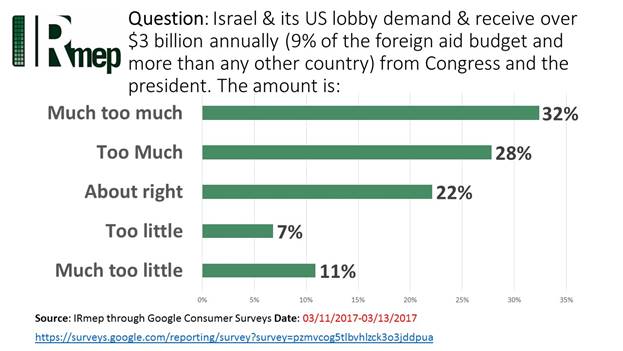
When informed of its relative size, 60
percent of Americans believe that U.S. foreign aid to Israel is
either much too much or too much.
And this finding is also reflected in polls by Shibley
Telhami and some Gallup polls.
This has been consistent over time.
Recent years—2014, 2015, 2016—showed similar levels of
responses. Americans
responding to this poll have been informed that aid has been around
9 percent of the total foreign aid budget, but this question will
have to change in the future, as Dale has mentioned, since the Trump
administration proposes cutting the State Department budget, while
leaving aid to Israel untouched.
So we should ask ourselves when that happens, what will it
be—10, 20, 30 percent?
We don’t know yet.
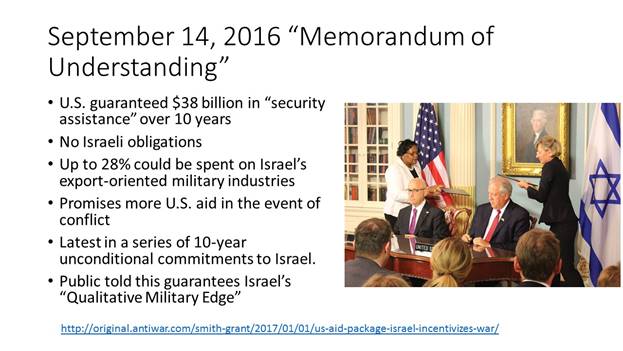
The Sept. 14 Memorandum of Understanding, the
U.S. guaranteed in this MOU security assistance over 10 years.
There are no Israeli obligations, and up to 28 percent could
be spent on Israel’s own export-oriented industries.
This is the latest in a series of 10-year commitments, and
the public has been told that this will guarantee Israel’s
qualitative military edge.
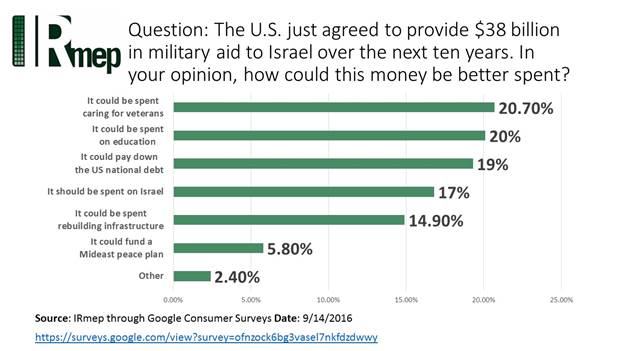
When we polled this right after the MOU
signing, the public responded—60 percent of them—that they had
higher priorities. When
questioned if the $38 billion was a good investment, 60 percent said
health care for U.S. veterans, education, and paying down the
national debt would be far better expenditures.
Only 17 percent thought it should be spent on Israel.
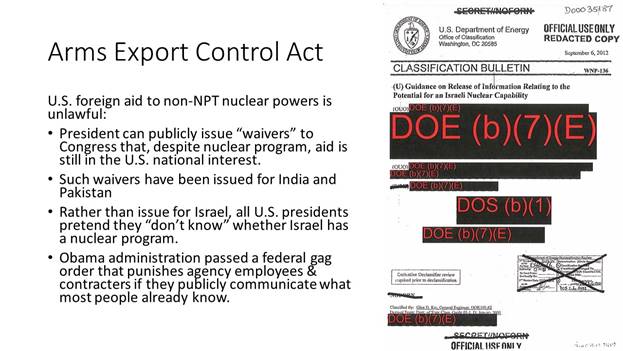
When Congress passes aid to Israel and
presents them to the president in bills to be signed, both rely on a
subterfuge that the U.S. does not, and indeed cannot, know whether
Israel has nuclear weapons.
However, under the Arms Export Control Act, procedures must
be followed whenever the U.S. provides foreign aid to known nuclear
powers that have not signed the Nuclear Non-Proliferation Treaty.
In 2012, under increasing pressure—including from a
journalist who’s here today and Helen Thomas, who’s not with us—the
Obama administration passed a gag order that punishes any federal
employee or contractor who speaks out about what most people already
know, which is that Israel has nuclear weapons.
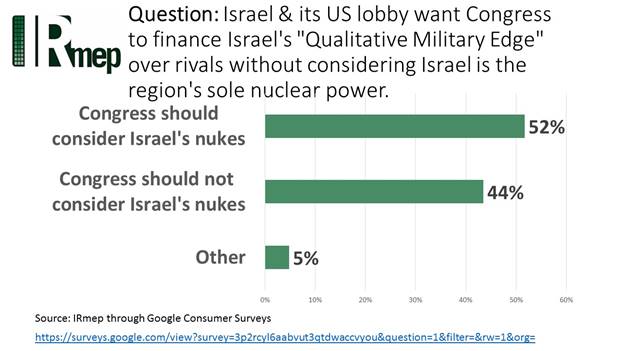
So in a public opinion survey, first of its
kind, most Americans would prefer an honest discussion about
Israel’s nuclear weapons.
Fifty-two percent said Congress should take nukes under
consideration.
Officially Congress has said it does not take a position on this
matter. But under
pressure from reporters—a handful—and legal action to block U.S. aid
over its nuclear weapons program, and dogged reporting, this could
change.
[Start of video clip]
Sam Husseini:
Do you acknowledge that Israel has nuclear weapons, sir?
Sen. Chuck Schumer:
I’m not—you can go read the newspapers about that.
Sam Husseini:
You can’t acknowledge that Israel has nuclear weapons, sir?
Chuck Schumer:
It is a well-known fact that Israel has nuclear weapons, but the
Israeli government doesn’t officially talk about what kinds of
weapons and where, et cetera.
Sam Husseini:
Could the U.S. government be forthright?
Chuck Schumer:
Okay. That’s it.
[End of video clip]
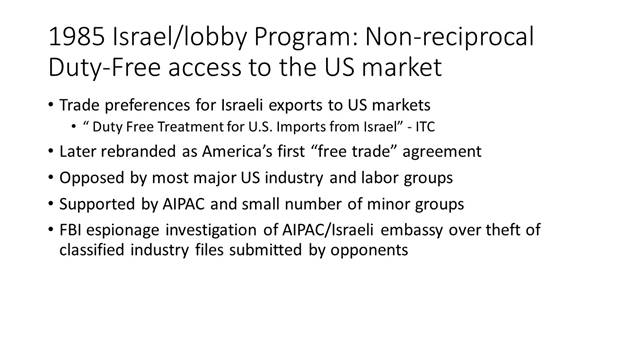
Grant Smith:
That was Sam Husseini, who is here with us today.
In 1985 Israel and its lobby were the primary force behind
providing preferential U.S. market access to Israeli exporters.
This was later rebranded as America’s first free trade
agreement. Because U.S.
industry and labor groups were unanimously opposed to it, an Israeli
Embassy operative covertly obtained and passed a 300-page classified
report compiled from proprietary industry data from the ITC to help
AIPAC overcome opposition. This
was investigated as a counterespionage matter by the FBI.
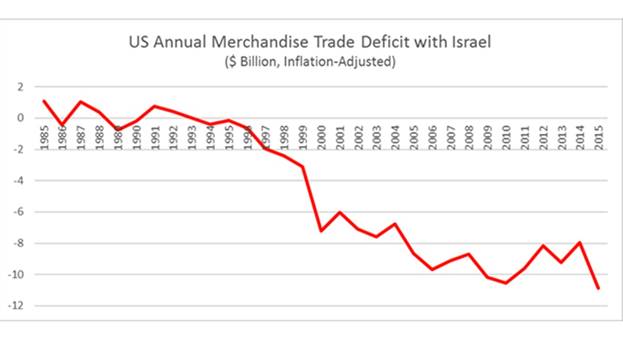
And, as could probably be expected from such
a process, it replaced a balanced trading relationship with a
chronic U.S. deficit to [Israel].
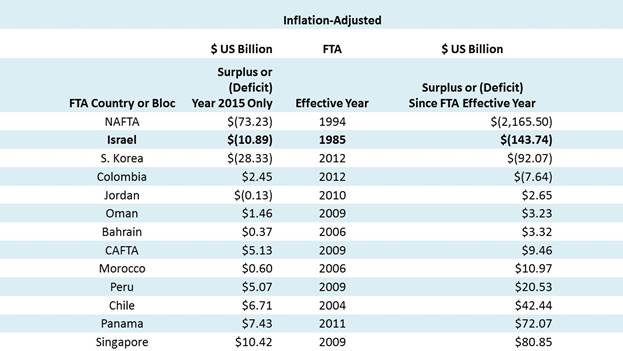
In fact, on an inflation- adjusted basis, the
U.S.-Israel Free Trade Agreement is the worst bilateral free trade
deal ever, with a cumulative deficit of $144 billion.
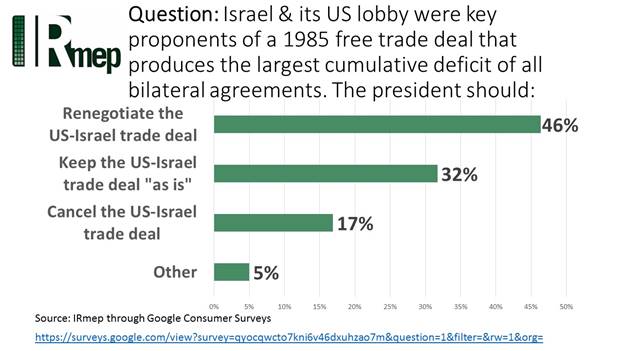
In this era of popular disapproval of trade
deals—whether it’s the Trans-Pacific Partnership initiative or the
North American Free Trade Agreements—when informed of the Israel
free trade deal, 63 percent of Americans would either renegotiate or
cancel it altogether.
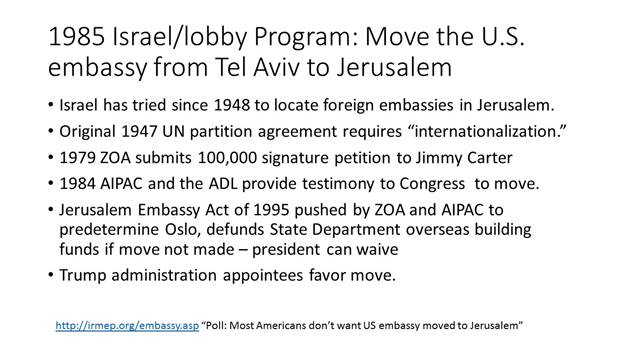
Another bad deal that has been a long-term
Israel and lobby initiative is moving the U.S. Embassy to Jerusalem.
Since 1948, Israel has been attempting to persuade foreign
embassies to relocate in Jerusalem, which is, under the original
partition agreement, supposed to be international.
But, leveraging Bob Dole’s presidential aspirations, in 1995
the Zionist Organization of America and AIPAC championed a law that
was passed that defunds State Department overseas building budgets
unless the U.S. Embassy is moved.
U.S. presidents have refused to do it, but there are now many
champions of the move in the Trump administration.
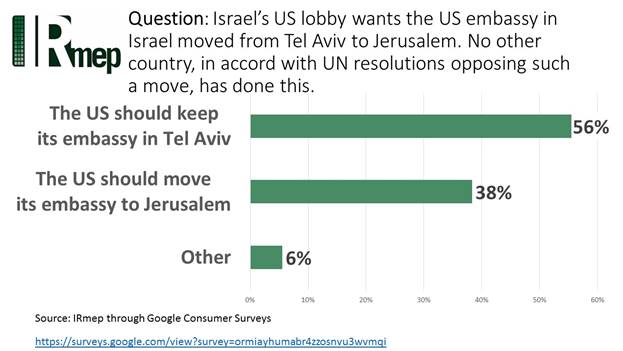
Americans are not so excited when told in a
survey question, “Israel’s U.S. lobby wants the U.S. Embassy in
Israel moved from Tel Aviv to Jerusalem.
No other country, in accord with the U.N. resolutions
opposing such a move, has done so.” Fifty-six percent of Americans
indicate the embassy should not move, while 38 percent say it
should.
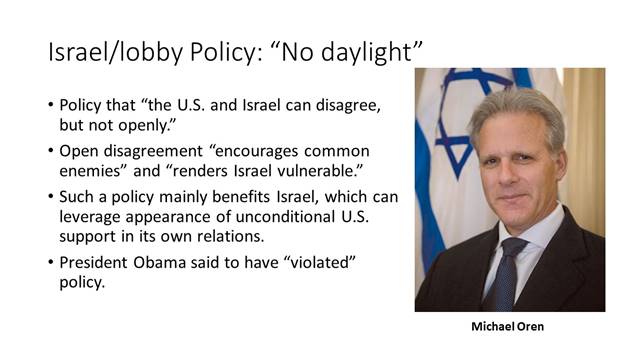
There is a renewed push to return to a policy
of no daylight between the United States and Israel.
This policy, particularly championed by former Israeli
Ambassador to the U.S. Michael Oren, means that the U.S. and Israel
can disagree, but not openly, since that would encourage common
enemies and renders Israel vulnerable.
Of course, such a policy mainly benefits Israel as a
bargaining chip it can put in its pocket and leverage the appearance
of U.S. unconditional support in its own relations. So there is an
effort underway for that.
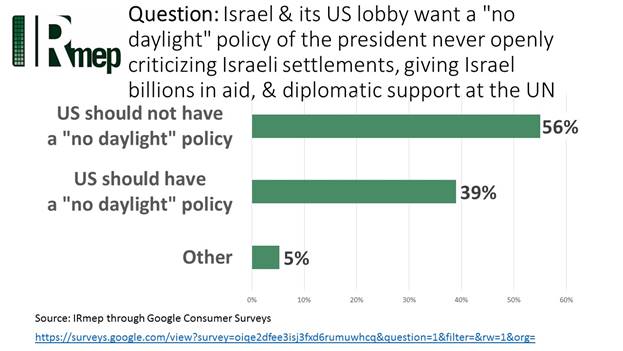
Americans, when told and asked, Israel and
its U.S. lobby are the only parties making such a demand in a
question—“Israel and its
U.S. lobby want a no-daylight policy, the president never
criticizing Israeli settlements and giving Israel billions in aid
and diplomatic support at the U.N.”—most say, 56 percent say, the
majority say, there should not be a no-daylight policy.
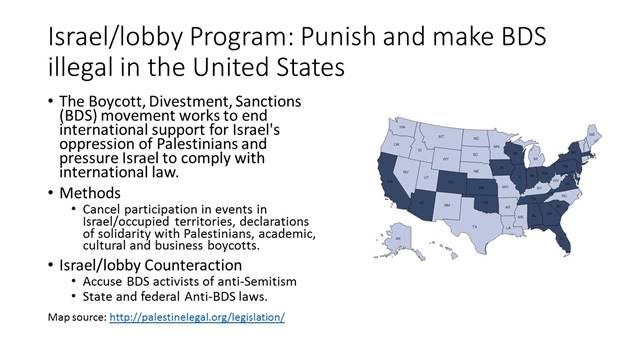
We have Maria LaHood with us today who can do
a much better job talking about what Boycott, Divestment and
Sanctions (BDS) are—a movement to end international support for
Israel’s oppression of the Palestinians—and the effort by the Israel
lobby to pass laws blocking this, making it illegal across the
country.
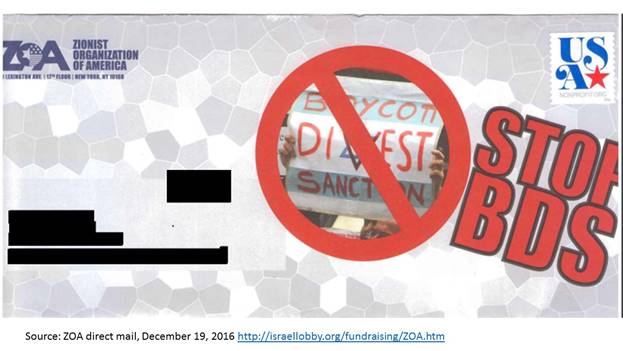
So I’ll only say that Israel lobby direct
mail fund-raising campaigns are virtually unequivocally focused on
stopping BDS as a fund-raising and major program initiative right
now. It’s highly
visible. It’s the
number one priority.
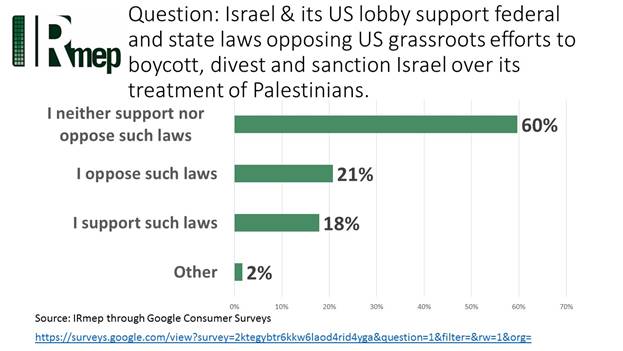
But Americans are ambivalent.
When asked, 60 percent neither oppose nor support such laws,
with 21 percent opposing them and only 18 percent supporting them.
So Americans are not behind
BDS, are not highly on board with it, and they also don’t support
the entire idea of single issue lobbying on behalf of a single
foreign country.
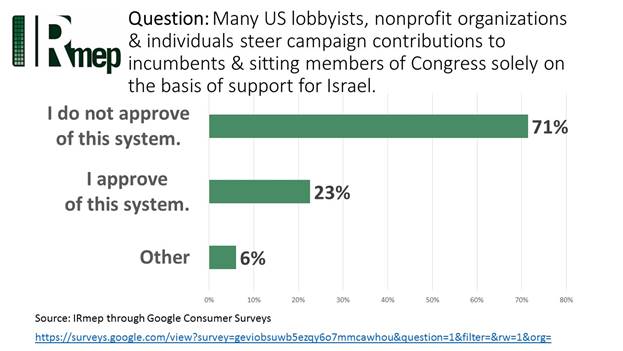
I think this is the most important survey
question, because it gets to the heart of the entire mechanism by
which the Israel lobby has accumulated so much influence—campaign
contributions. So here
it is. That system
ranges from seed funding of political candidates to funding through
coordinated stealth political action committees, bundled campaign
contributions, and pro-Israel mega donors.
Janet McMahon and two former congressmen will be talking
about that, I’m sure.
Seventy-one percent of Americans do not
support this system.
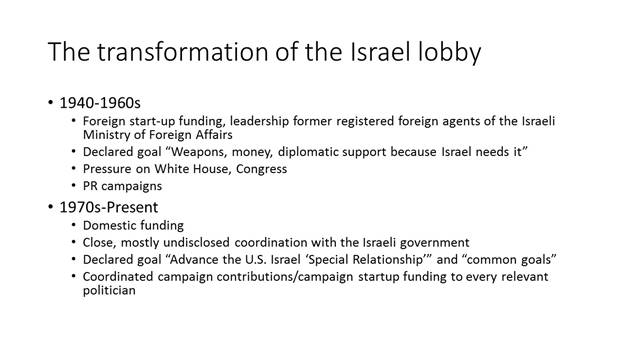
They are probably not aware, however, why
lobbyists for Israel no longer talk about getting guns and diplomacy
for Israel. They talk
about maintaining the U.S. special relationship with Israel, and
there is a legal reason for that.
Lobbyists for Israel, including the old-timers such as
Abraham Feinberg and the founder of AIPAC Isaiah Kenen, in their
writings and speeches were far more forthright in the early days.
They honestly stated that their goal was weapons, money, and
diplomatic support, because Israel needs it.
There was no talk of because America needs Israel.
AIPAC received, indirectly, foreign startup
money to launch itself, and today the tight coordination with the
Israeli government continues.
But the PR frame, the public relations frame, has changed.
Now, it’s one of preserving special interests and common
values. By the 1970s,
no matter what the lobby did, the Justice Department stopped
pursuing questions about whether some of its actors were in fact
foreign agents who should be regulated as such.
And since that year, a growing number of espionage
investigations of AIPAC, and even the ADL, were opened, but then
quietly closed for no justifiable reasons.
1970, in fact, was the last year the Justice Department took
an interest in the Israel lobby as a foreign agent.
There were in-depth hearings in 1962 and 1963 pleading with
the IRS to look at their tax-exempt status, but nothing happened.
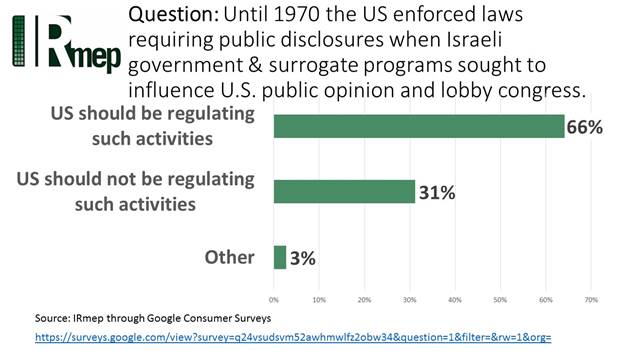
However, Americans appear to support a return
to that simpler time when foreign agents were compelled to comply
with disclosure laws and didn’t have quite so much power over
Congress and elected officials.
Sixty-six percent, in fact, when asked, favor returning to
regulating such activities.
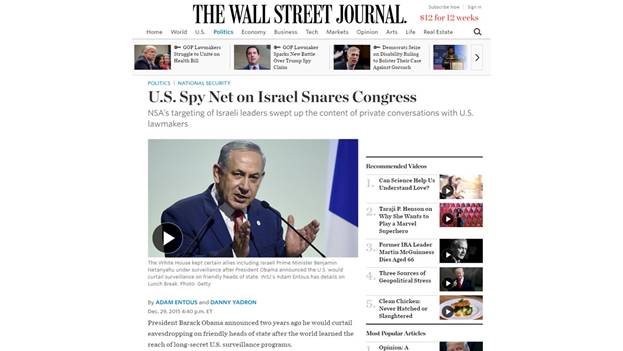
Perhaps this is driven by warranted
investigative journalism about coordinated Israel lobby and Israeli
government officials that are still using every means possible,
including covert ones, to win.
That includes an attempt to overturn a very beneficial—the
JCPOA—Obama administration deal with Iran which most Americans
favor, but which Israel and its lobby do not favor.
So you do have good journalism that came out
about surveillance of the negotiations with the Iranians, about the
Israeli government offering to do whatever is necessary with
individual members of Congress if they would oppose passing this
deal which the entire mainstream establishment Israel lobby—AIPAC,
the ADL, the AJC—were united in opposing.
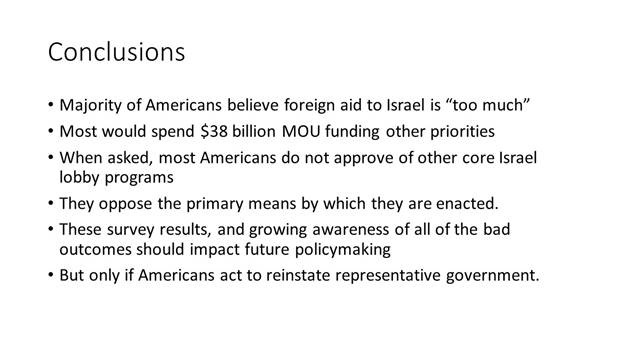
So, in conclusion, solid majorities of
Americans polled, when using accurate survey technology, believe
that U.S. foreign aid to Israel is too much.
They don’t really even approve of the means by which they’re
won, and the funds and the U.S. unilateral commitments that are made
to execute. However,
this is a passive majority.
None of these opinions and views has recently been, with few
exceptions, translated into direct action by their members of
Congress. So only
through active opposition, rather than passive opposition, which is
clearly out there, will Americans be able to get their government
back into the business of representing them.
And only by clearly asking about, and polling, and surveying,
and doing serious research about Israel lobby programs and what
Americans think about them, will we be able to have a process that
takes wing and goes viral, so to speak, in terms of engaging more
Americans to get out of this passive mode and become active
participants once again with their government.
So with that, I am hoping our wonderful
ushers, who are here today earning some community service hours,
will circulate—Adrien, and Tabatha, and Sebastian, there we have
Sapphire. If you have
any questions, please pass your cards to them.
We’ve got a very tight schedule, so we’re trying to keep our
question and answer sessions getting to the most important questions
first. Thank you.
Do we have any questions yet?
Questions & Answers
Dale Sprusansky:
One question off the bat here is, so you used the term Israel lobby
in your polling, how can you be certain that Americans understand
what exactly you mean by Israel lobby when you mentioned it?
Grant Smith:
Right. That’s a good
question. We did some
preliminary polling, and these slides and a subsequent report will
be out soon. But it
turns out that if you ask people what is the Israel lobby in the
context of these questions about Congress and international
relations, they will actually say it’s not the registration desk of
the hotel in Jerusalem, the King David Hotel.
They’ll say it’s not a group in the Israeli Knesset which has
a similar name. They
know what it is. So I can
assure you that on the basis of having done some preliminary work,
we’re not asking about an entity that is completely unknown at this
point.
Dale Sprusansky:
There is just one question about how the polling was conducted and
the sampling. Were
these respondents simply voluntary or self-selected?
Was there any regional, age, religious or other kind of
sampling?
Grant Smith:
That’s great. So
there’s been a lot of junk polling that’s been done.
When I pulled this presentation together, I had a section on
junk polling. There is
a piece of polling that was conducted by Kellyanne Conway, many of
you have heard about it, a self-selected poll on Muslims which did
not have a representative sample.
It had extremely, sort of toxic implications and it’s
informing the government right now.
You can when you—and I suggest you download this slide deck.
You can certainly go to all of these hyperlinks at the bottom
of this Google survey and see every single response, and look at the
representative sampling that was done by Google to get these
responses. This is not
a Kellyanne Conway or other type of poll which has an agenda.
Yes, we’re asking about the lobby because it’s important and
it can be done. But
this is a legitimate, statistically significant survey.
Dale Sprusansky:
We just have another question kind of, I guess, asking you to draw
some conclusions based on these polls.
Do you feel that they represent America’s moving more away
from a pro-Israel stance?
Do you think we’re at a tipping point right now?
The person points out that polls show that Democrats and
young people are increasingly prone to be siding with Palestine.
Grant Smith:
I’m not sure we’re at a tipping point.
I think there are a lot of
people in this room, including some speakers who are coming up very
soon, who’ve done an excellent job in bringing a higher public
awareness about what the Israel lobby is, what its agenda is.
But the only way we’re going to get a tipping point, I think,
is if we manage to spread the word a lot further; if we manage to
continue drawing alternative media; if we continue to have brilliant
journalism exposing some things.
And I include the Wall
Street Journal, which broke an important story.
It’s not just
Mondoweiss, which is a
great place as well—and I notice that Philip Weiss is here today, so
be sure to say hi to him.
There are others, including one of my favorites,
Antiwar.com, where I
write a lot of articles.
We’re trying to spread the word, because there hasn’t always
been a welcoming presence for this type of information in the
mainstream media.
Dale Sprusansky:
Great. So a question
here about—not directly
related to polls, but since you are involved in this, what is the
latest on your legal actions on Israel’s nuclear arsenal?
Grant Smith:
Right. So we found that
in order to get good information from the government, you have to
file a FOIA and then follow it up with a lawsuit.
This afternoon, when we’re
sort of wrapping up, I know some of you have been very interested in
a lawsuit we filed about Israel’s nuclear program, about the
compliance of foreign aid with Symington and Glenn amendments inside
the Arms Export Control Act.
There’s talk about that a little bit toward the end.
But I can tell you, that lawsuit is ongoing and we’re
learning a great deal about functions of government by pursuing it.
So more to come on that.
Dale Sprusansky:
Great. Then a question
to broaden the conversation about military contractors.
Someone asked, aren’t they behind most of the lobbying for
U.S. aid to Israel?
Grant Smith:
Yeah, I get a lot of things in my inbox saying, you know, Grant,
this is really about Lockheed Martin, this is really about the large
defense contractors.
But if you look at their total revenue compared to the $3 billion a
year/$4 billion a year we know about given to Israel, it’s a tiny,
tiny fraction. If you
go to the signing ceremonies for MOUs—which
is part of my job, I do
that—you don’t see a lot of defense contractors attending those
events.
So I would have to say, based on the data,
based on the book Big Israel,
based on the book Spy Trade,
based on a lot of research and a lot of investment into this, I
don’t think that they are a major part of the push to pass massive
foreign aid packages to Israel.
In fact, a lot of them really don’t like and attempted to get
the majority of the last MOU spent on American arms as opposed to
being spent on developing Israel’s export-oriented industries.
AIPAC takes the lead on this.
This is their key core function, arms and money in the form
of serial foreign aid packages from the United States.
It’s not the military and defense contractors.
Dale Sprusansky:
All right. Well,
perhaps this is a good transition to our next speaker, our keynote
speaker. We have a
question about Mearsheimer and Walt’s book.
They claim the Israel lobby is as American as apple pie.
Do you agree with that assessment?
Be careful.
Grant Smith:
He’s not here yet, is he?
I have to say, I wrote an entire book called
Spy Trade, about the
espionage that was conducted to pass America’s first free trade
agreement. It wasn’t as
American as apple pie what happened to U.S. industry.
It just wasn’t.
It wasn’t as American as apple pie when two AIPAC executives managed
to obtain information they thought they could use from Col. Lawrence
Franklin to gin up an attack on Iran.
I think that there’s far
more going on, including coordination to oppose the JCPOA, that’s a
mix. It’s lobbying.
It’s phone banking. It’s
coordinated campaign contributions.
But there is a foreign covert action component to a lot of
these things. And so,
to me, it’s not as American as apple pie.
Sorry.
Dale Sprusansky:
Okay. I think that we
should wrap it up.
Grant Smith:
Do we have one more?
Dale Sprusansky:
We have one more quick one.
Grant Smith:
Okay.
Dale Sprusansky:
Why does the IRS continue to grant pro-Israel groups, especially
those that fund settlements, tax-exempt status?
Grant Smith:
I think that’s a great question.
Recently, a test case was that the Zionist Organization of
America lost its tax exempt status, and so it had to go back and
re-apply. This ancient
organization, which was really one of the originals, had to go back
and apply to the IRS and make its case for why an organization that
was purely about promoting Zionism in the U.S. was tax-exempt.
And we obtained all of the correspondence from the IRS about
that. They asked the
question. Mort Klein
and his team of lawyers evaded it, and they were never asked again.
The question has never
really been put forth and answered by the IRS.
Senator J. W. Fulbright made an attempt to
ask about the status of AIPAC, about the status of the Jewish Agency
at that time, and a number of other organizations, to the IRS after
a seminal investigation in 1963.
And they strong-armed him and did not answer the question.
So it’s an open question.
The one about settlement financing in particular is the
subject of litigation right now.
The problem is always standing.
You should probably ask a real lawyer, like Maria LaHood,
that question in the following sessions.
Dale Sprusansky:
Great. Thank you very
much, Grant.